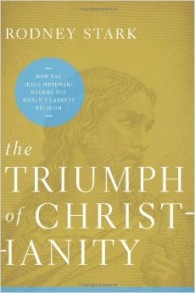Early Christianity provided “islands of mercy,” not promises of “pie in the sky”…

“Misery and Mercy” is the title of the chapter where Rodney Stark confronts the accusation by atheists that Christianity caters to the weak and suffering by promising “pie in the sky.” Yes, he says, it is most often the affluent who start new religions. But in the case of Christianity, history shows that rich and poor alike turned to Christianity “in response to the widespread need to be comforted for the miseries of life—not merely poverty, but disease, the deaths of loved ones, and all the other misfortunes and disappointments humans face.”
The central idea is, of course, that Christian faith offers a sedative for suffering in this life by promising that we will be fully compensated in the next, when “many that are first will be last, and the last first” (Mat. 19:30). Atheists like to ridicule this aspect of faith as “pie in the sky.”
What is almost always missed is that Christianity often puts the pie on the table! It makes life better here and now. Not merely in psychological ways, as faith in an attractive afterlife can do, but in terms of concrete, worldly benefits. Consider that a study based on ancient tombstones has established that early Christians outlived their pagan neighbors! What that demonstrates is that Christians enjoyed a superior quality of life. They did so because of their commitment to what was unusual virtue in ancient times: “the quality of the mercy,” as Portia put it in the Merchant of Venice, played a major role in the growth of early Christianity. …
Stark points out that, while Christianity started with Jesus’ ministry in the mostly rural areas of Galilee, his followers soon took the new faith to the urban centers. He chronicles the social role Christianity played in those ancient cities—those urban areas that “were far more crowded, crime-infested, filthy, disease-ridden and miserable than are the worst cities in the world today.”
In the midst of the squalor, misery, illness, and anonymity of ancient cities, Christianity provided an island of mercy and security.
Foremost was the Christian duty to alleviate want and suffering. It started with Jesus: “for I was hungry and you gave me food, I was thirsty and you gave me drink, I was a stranger and you welcomed me, I was naked and you clothed me. I was sick and you visited me, I was in prison and you came to me…Truly, I say to you, as you did it to one of the least of these my brethren, you did it to me” (Matt. 25:35-40).
James 2:15-17 expresses a similar idea. … In contrast, in the pagan world, and especially among the philosophers, mercy was regarded as a character defect and pity as a pathological emotion: because mercy involves providing unearned help or relief, it is contrary to justice. As E.A. Judge explained, classical philosophers taught that “mercy” indeed is not governed by reason at all,” and humans must learn “to curb the impulse”; “the cry of the undeserving for mercy” must go “unanswered.” Judge continued: “Pity was a defect of character unworthy of the wise and excusable only in those who have not yet grown up.”
This was the moral climate in which Christianity taught that mercy is one of the primary virtues – that a merciful God requires humans to be merciful. Moreover, the corollary that because God loves humanity, Christians may not please God unless they love one another was even more incompatible with pagan convictions. But the truly revolutionary principle was that Christian love and charity must extend beyond the boundaries of family and even those of faith, to all in need. As Cyprian, the martyred third-century bishop of Carthage explained, “there is nothing remarkable in cherishing merely our own people with the due attentions of love. … Thus the good was done to all men, not merely to the household of faith.”
It wasn’t just talk. In 251 the bishop of Rome wrote a letter to the bishop of Antioch in which he mentioned that the Roman congregation was supporting fifteen hundred widows and distressed persons. This was not unusual. In about the year 98 CE, Ignatius, bishop of Antioch, advised Polycarp, the bishop of Smyrna, to be sure to provide special support for widows. As the distinguished Paul Johnson put it: “The Christians…ran a miniature welfare state in an empire which for the most part lacked social services.” …
These charitable activities were possible only because Christianity generated congregations, a true community of believers who built their lives around their religious affiliation. And it was this, above all else, that insulated Christians from the many deprivations of ancient life. Even if they were newcomers, they were not strangers, but brothers and sisters in Christ. When calamities struck, there were people who cared – in fact, there were people having the distinct responsibility to care! All congregations had deacons whose primary job was the support of the sick, infirm, poor, and disabled. …
Stark concludes his chapter on “Misery and Mercy” by countering those who would say that his emphasis on mercy fails to properly appreciate the “religious motivations for the rise of Christianity.”
This objection overlooks that these worldly benefits were religious in the fullest sense. “Truly, I say to you, as you did it to one of the least of these my brethren, you did it to me” (Matt. 25:40). It was by imitation of Christ that Christians were able to live longer and enjoy more comfortable lives.
Dr. Rodney Stark is Distinguished Professor of the Social Sciences and Co-Director of the Institute for Studies of Religion at Baylor University. He is the author of numerous articles and thirty-two books, including The Triumph of Christianity: How the Jesus Movement Became the World’s Largest Religion and America’s Blessings: How Religion Benefits Everyone, Including Atheists.


 March 10, 2015
March 10, 2015 







Comments are closed.